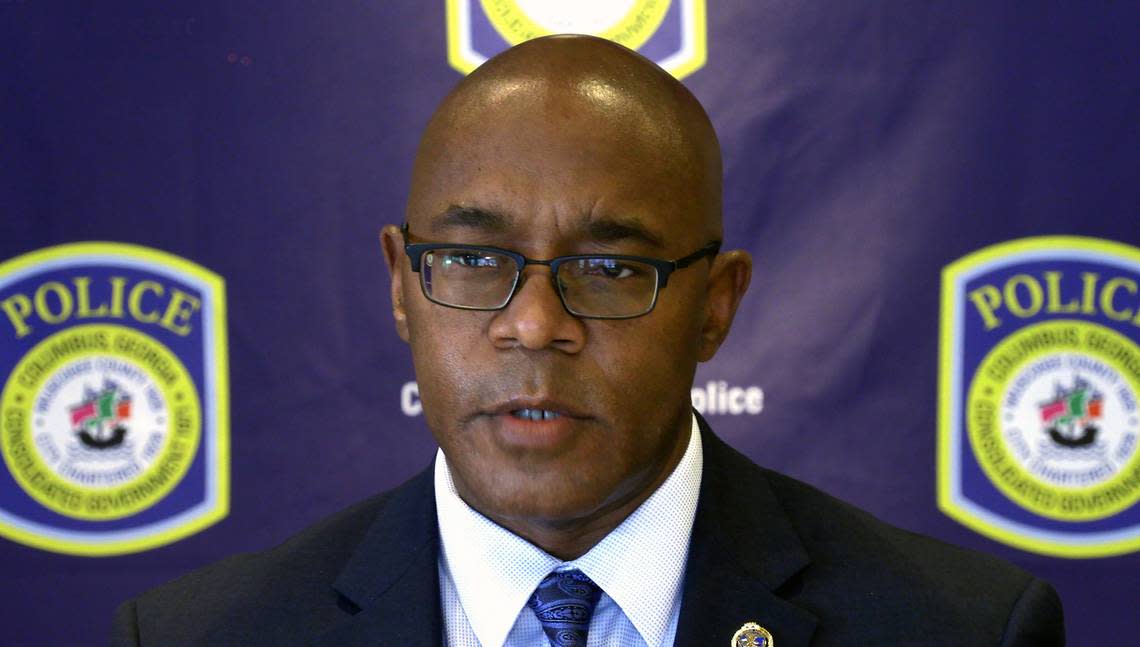‘Uncharted waters.’ How will Columbus-area law enforcement handle abortion cases?
Columbus-area law enforcement agencies offered little to no specific details about how they’d handle investigations and possible arrests under Georgia’s new abortion law.
The Ledger-Enquirer sent four questions to law enforcement agencies in the six-county region — Chattahoochee, Harris, Marion, Muscogee, Talbot and Taylor.
The Muscogee County Sheriff’s Office said these cases were not priorities. The Taylor County Sheriff’s Office said it would refer cases to the GBI. The Columbus Police Department and the Harris County Sheriff’s Office said they would investigate possible violations.
The Chattahoochee, Marion and Talbot sheriff’s offices did not respond to multiple requests for comments.
‘We are operating in uncharted waters’
The state’s “heartbeat” abortion ban has been in effect for roughly two weeks.
And while Georgia’s legal and medical communities have unanswered questions about the law, the local courts, prosecutors and law enforcement agencies all play a part in its enforcement.
Under Georgia’s law, most abortions are banned once cardiac activity is detected — about six weeks into pregnancy. The law includes exceptions for rape and incest so long as the following criteria are both met:
Pregnancy has not passed its 20-week mark
A police report has been filed
The law also allows for abortions if a physician determines that a medical emergency exists or that the pregnancy is medically futile.
District Attorney Stacey Jackson previously told the Ledger-Enquirer that his office would address potential violations of the law on a case-by-case basis, leaving the door open for prosecution. Decisions to prosecute, he added, would depend on whether or not law enforcement agencies made arrests and if the cases are referred to his office.
That means law enforcement agencies in his six counties —Chattahoochee, Harris, Marion, Muscogee, Talbot and Taylor— could influence the legal process.
Here’s what the agencies said about how they’d handle abortion cases:
COLUMBUS POLICE DEPARTMENT
In a statement, Columbus police spokesperson Sgt. Aaron Evrard said the department would investigate potential violations.
“The Columbus Police Department will investigate violations of Georgia Law that we are aware of,” he said in an email. “Criminal charges may be made when and if evidence exists to support those charges as outlined by Georgia law.”

MUSCOGEE COUNTY SHERIFF’S DEPARTMENT
Muscogee County Sheriff Greg Countryman told the Ledger-Enquirer in a statement that his office would not dedicate resources to seek out these cases. The office’s role in patrolling and investigating criminal cases has increased under Countryman’s term.
“If we had to make an arrest based on the laws of the State of Georgia, we would have to consult with the District Attorney/Solicitor General to see if they are willing to prosecute the case,” he said. “It would not be wise to utilize manpower in this area, while our focus has been going after members of gangs, and interrupting criminal enterprises. We have made an impact and can see the difference in our community. My focus right now is taking back our county and improving the quality of life for every citizen of Muscogee County.”
When asked how his department would handle and investigate reports of rape and incest related to abortion cases, Countryman said his office would contact the District Attorney to determine if the office wants to prosecute.
“This is all new. We are operating in uncharted waters as it relates to this recent court ruling,” he said. “Presently, our focus is on taking back our community.”

HARRIS COUNTY SHERIFF’S DEPARTMENT
Harris County Sheriff Mike Jolley told the Ledger-Enquirer that his office would work “any and all reports of criminal activity.”
“The Harris County Sheriff’s Office will investigate all violations of criminal law in accordance with (state) law and cases will be referred to the District Attorney’s Office and local grand juries,” he said in a statement. “Priority on this type of investigation will be as high as manpower allows.

It will be up to the DA’s office to prosecute,” he added.
TAYLOR COUNTY SHERIFF’S DEPARTMENT
Taylor County Sheriff’s Department spokesperson Kay Carpenter told the L-E that they would refer these cases to the Georgia Bureau of Investigation.
“As with all cases, we consider them of the highest priority and we would refer any of this nature to the Georgia Bureau of Investigations. As for any investigations and/or arrests which would then, if deemed necessary by the G.B.I., would be turned over to the District Attorney,” she said in an email.
‘We really don’t know how the law is supposed to work’
As local law enforcement offered few specific details about how they’d handle these cases, legal experts and medical professionals have said portions of Georgia’s abortion law remain unclear.
The Atlanta Journal-Constitution reported last month that many state agencies didn’t have all the guidelines and procedures to grant embryos personhood rights under the new law. Legal experts and doctors have questions about how the abortion restrictions will be carried out in practice.
The AJC also reported that DAs could potentially seek a murder charge due to the technical language of Georgia’s ban.
Georgia State University College of Law professor Anthony Kreis told the L-E that the law leaves open questions such as:
Will a pregnant person be investigated for a miscarriage?
Is law enforcement obligated to investigate rape and incest cases tied to abortions? What does the law empower them to investigate?
With the increasing availability of abortion pills, what happens if the first dose is taken out of state when the pregnancy is more than six weeks along, but the second dose is taken while in Georgia? Does local law enforcement investigate?
Who is able to make reports of rape, incest and other possible abortion-related violations to law enforcement? How will they decide what to investigate?
The uncertainty could create a chilling effect on victims of rape and incest who don’t want further intrusion, he said.
“The first problem is: We don’t really know how the law is supposed to work,” Kreis said. “If lawyers, public policy experts and legislators... aren’t sure about the actual mechanisms of it, then it’s also going to be unclear to law enforcement officers what they are supposed to be investigating or not.
“The extent to which a surveillance state is necessary to enforce all of this is overwhelming,” he added. “I think we’re at a very critical period where law enforcement needs to be asked what they think their obligations are... It’s a lot of ‘who knows.’”
